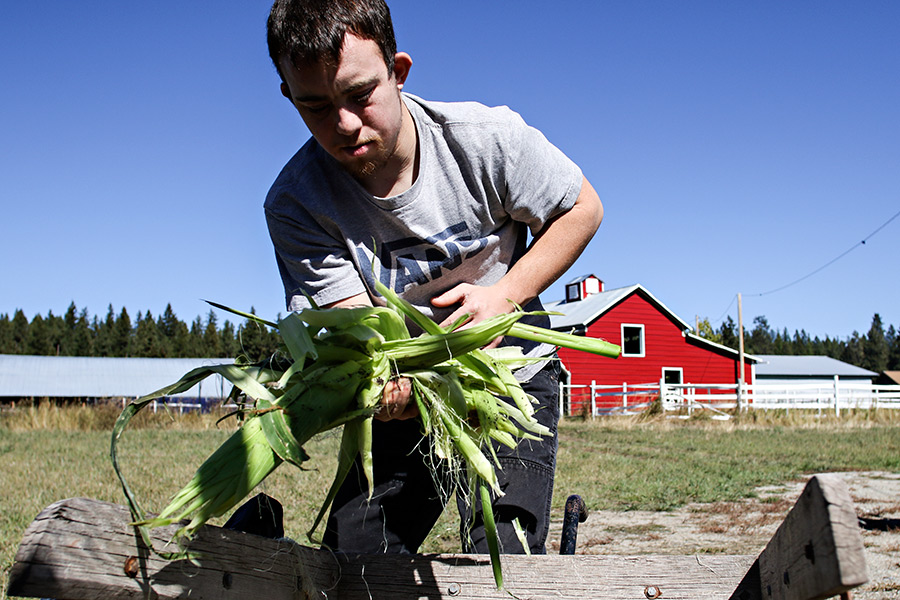Farming Fresh, Homegrown Healthcare
Local therapeutic farming program earns recognition from Montana Community Services Bureau and state health department
By Clare Menzel
On a warm September afternoon, five men drove across an open field just west of Kalispell in a train of farm vehicles. Les Keller, the semi-retired owner of Centennial Farm, led the group from the community garden, where they’d picked zucchini and green tomatoes, to a barn, where they fed the horses and cows leftovers from the 30 cobs of corn they had eaten for lunch. From there, they drove into the woods and loaded some 20 stray logs onto one truck. It was a productive afternoon, in more than a few ways.
The farmhands in the convoy — Tim Harris, Ryan Trout, Arthur Madeira, and Andrew Williams — are four of 65 men, women, and children who work at 12 farms in Northwest Montana through placements with Flathead Care Farming, a program offered by the Kalispell-based statewide homecare provider A Plus Healthcare. The therapeutic day farming program, now three-and-a-half years old, provides an empowering and evidence-based form of healthcare for folks with developmental or physical disabilities.
“It’s not about free labor for farmers,” said A Plus Healthcare chief operations officer Maarten Fischer. “It’s to have meaning and purpose, to be physically and socially active.”
Fischer, a Dutch transplant who helped build a now $5 million visitor-oriented and therapeutic farming industry in the Netherlands, founded Flathead Care Farming in March 2013, and the program has since gained international recognition. Last week, it earned a 2016 Exemplary Program award from the Montana Community Services Bureau and the Department of Public Health and Human Services’ Medicaid Home and Community Based Services program.
It is also the subject of a recent documentary, The Country Side of Care, produced by Dutch filmmaker Sanne Hijlkema. After learning that care farming is still an “intriguing new development in Northwest Montana,” Hijlkema “decided to spend some time with these pioneers,” including Fischer and Keller, to learn about the burgeoning movement in the western United States. The independent film premiered at Flathead Valley Community College in August, and will appear at the Delaware Docs Without Borders Film Festival in October.
“We know that farming has pretty amazing healing powers and calming powers,” said Pam Gerwe, an owner of Purple Frog Farm in Whitefish and a host of Flathead Care Farming clients since the program’s pilot run in 2013. “Maarten’s program brings the funding piece — the recognition that there’s therapeutic value, that’s it’s worthy of acknowledging the farmer’s time.”
Farmers, who undergo training to become part of the program and devote significant portions of their time to this work, are paid between $50 and $100 daily to host clients. About half of Flathead Care Farming’s clients are referred through Medicaid caseworkers, and Fischer has also partnered with Center for Youth Restorative Justice, the Special Friends Advocacy Program, Lighthouse Christian Home, the Flathead County Agency on Aging, and the Flathead Job Service to expand care farming’s reach. He hopes to soon extend the program to aging veterans or those with post-traumatic stress disorders, and to expand an existing vocational rehab program though a partnership with FVCC.
Farms are a good place to test a number of skills, Fischer says, and farmers often show their workers what goes into agriculture besides physical labor, like website design or customer interaction. Positions through Flathead Care Farming are the first job that many participants have held, and for others, farms are the first workplace where they’ve experienced affirmations of their humanity and dignity regardless of their capacity.
“It’s such a basic human right to be treated with respect,” Gerwe said.
Therapeutic benefits include opportunities for clients who might otherwise just stay at home to exhaust themselves physically and find stimulation among friendly company. They cultivate a sense of stewardship and a “perspective change to a more glass half-full,” Fischer said. Being outdoors and working in beautiful settings can make a big difference, Gerwe and Keller noted, and Fischer said that when clients spend time outside on farms, the amount of overall care they need can drop by 50 percent. The high level of medical care many clients receive can be alienating, Fischer said, and many “feel they have escaped” when they visit a farm.
“I didn’t get so much feeling of appreciation,” Tim Harris said of jobs he’s held elsewhere. “Whereas here I feel a sense of belonging. Ever since I started, I’ve enjoyed the camaraderie, working with guys like this … It’s a challenge for some folks who have issues with anger or they might have issues emotionally. This is kind of an outlet for them to be with other people and not feel so trapped.”
Another benefit to the program for many male workers is the chance to interact and work with women in healthy ways. Gerwe says that one client who has struggled with this recently told “one of our workers she was looking particularly intelligent.” The same worker has had difficulty with his memory after suffering a traumatic brain injury, but three days after visiting the care farm, he was able to list, in minute detail, the steps to complete a farm task. He’s also begun to grow kale at home, something new for the family, who told Gerwe they’d never eaten the vegetable before their son began working at Purple Frog.
With so many benefits so readily apparent, interest in Fischer’s program has piqued beyond the region. He regularly receives calls from healthcare workers in other towns hoping he might expand the program. But for now, Fischer says his focus is on growing an inclusive community care ethos on farms across the Flathead.